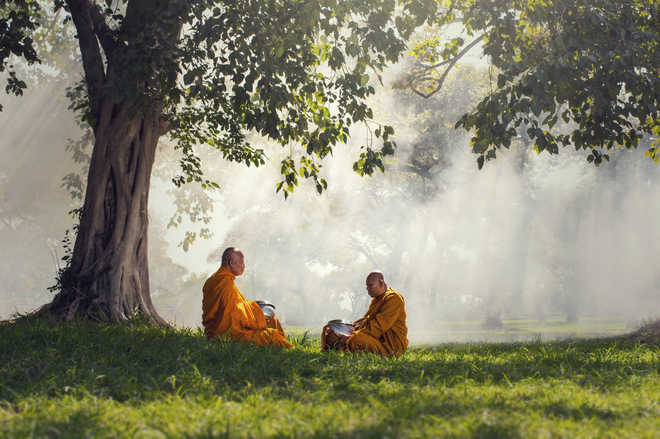Aparigraha: Virtue of non-possessiveness
Dr Satish K Kapoor
Na vittena tarpaniyo manushyah – ‘Man can never attain peace with money.’
Alexander the Great of Macedon spread his hands open and wide before dying, to give the message that one leaves the world empty handed.
Aparigraha or non possession is one of the five sacred vows or Mahavratas to be taken by the Jaina monks, others being ahimsa, non-violence, satya, truth, asteya, non-stealing and brahmacharya, celibacy. These ascetic principles are the same as mentioned by sage Patanjali, though with a slight difference in emphasis and philosophical meaning.
The tendency to run after worldly goods or to hoard material objects beyond one’s basic needs is born of a self centric approach to life. It pollutes the mind and dwarfs the soul by stoking the subliminal inclination in a person to grab that which belongs to someone else. This may generate, in turn, conflict, tension, competition, and violence in society besides creating impediments in one’s spiritual growth.
Material desires whet the appetite for more. So they have to be monitored, restrained and curbed. The thirst for money, gems, gold, land, or other valuables, is insatiable and it confines one to the mundane level, making the mind restless, torpid or distracted. Inner peace is eclipsed in the process. A mere thought of limiting one’s needs is a step towards spirituality.
Aparigraha can be cultivated in life through right understanding and purity of vision. It releases one from the weight of karma and leads to a state of passionless peace. Aparigraha can have three dimensions: that which has no roots in one’s psyche and is observed merely due to religious injunctions; that which results from dispassion caused by failures, broken relations or aborted ventures and ; that which ensues from the depths of being after right contemplation. Those in the first two categories may revert to their habit of running around material possessions. But the last, adheres to the path of renunciation, irrespective of allurements.
Aparigraha implies freedom from mental gluttony for goods or objects that one holds dear. It is pinning faith in the Divine for the fulfillment of future needs. Both the ascetic and the householder are expected to renounce in accordance with their respective dharma. Patanjali says (Yoga Sutra II.39): Aparigrahasthairye janmakathantasambodhah-
‘When a man becomes steadfast in his abstention from greed, he gains knowledge of the past, present and future existences.’
Aparigraha helps one to manifest divine consciousness within through self control, self restraint and self detachment. For the ascetics, Aparigraha is the path of nivritti, the tendency to move away from the world after judicious introspection, to be distinguished from the path of pravritti or worldly involvement. However, for the householder, Aparigraha is not a plea for inaction or withdrawal from worldly activities but the realisation that the universe with its wealth is under the proprietorship of the Supreme soul, and that one should take only as much as is needed or ordained for him. In this sense, the advanced ascetics alone may find bliss in total renunciation.
From the social standpoint, non-hoarding of goods or wealth can fulfill the requirements of the needy. Mahatma Gandhi based his concept of Sarvodaya, ‘welfare of all’ on the principle of Aparigraha. His foremost disciple, Acharya Vinoba Bhave, collected surplus land from big landlords so that it could be distributed among the landless.
Aparigraha is both a virtue and a value which has governed the spectrum of Indian idealistic thought for millennia. In this age of consumerism, it needs to be imbibed by one and all to build up an egalitarian social order without state intervention.
(Dr Kapoor is a noted educationist, historian and spiritualist )









